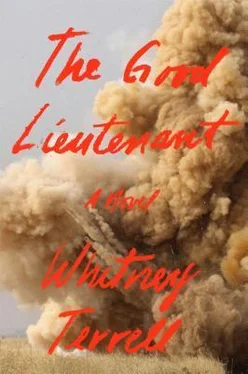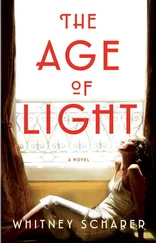“I could’ve stayed in bed.”
“Well, that goes without saying.”
“I’m pretty decent in bed. I know you have a hard time admitting it.”
“Try me,” Fowler said.
“Did you check my junk?”
She was straightening him up, trying to judge the angles on getting him out, and her chin was down in that territory.
“I’m serious. I want to make absolutely sure, when we get out of here, that you check my junk over carefully.”
She tugged his belt. “What for?” she asked. “Brass?”
But it didn’t work quite exactly right, the old banter thing. The skin tightened shiny along his temples, a simulacrum of amusement, but then, after a couple of seconds, he rolled his head. “What a shit show,” he said. “Look at what we did.”
“It was the fucking hadji’s fault,” she said.
“I saw him, the guy you wasted,” Pulowski said. “I saw his face. It’s the same guy who wrote that note. He was trying to wave us away—”
“He was guilty,” Fowler said, though she felt a sickness crawl across her skin like sweat. “He was guilty.”
Pulowski backhanded his nose to clear it of snot. “No,” he said. “No. If he was a bad guy, he wouldn’t have waved us away.”
“Pulowski.” She’d found the right tone finally. Not a lover’s voice, a commander’s voice. Masterson’s fuckup erasing confidence. “Tie it off. Okay? We got the paperwork on this guy. You found him. You did the right thing—” Without warning, she braced and tried to lift him from the cab. Pulowski stared bug-eyed, as if he were slowly being inflated with air, and then when she tried to tear his leg out from beneath the dash, he began to thrash and claw, making a deep horrible humming sound in his throat, and she had to set him down again, resting her cheek against the sweaty chest of his fatigues. “Okay. We’re going to need a better plan.”
Pulowski rallied, just marginally. “Ya think?”
She didn’t talk after that. The floorboard was wet with blood, and she lifted his right leg so it lay across her back and grabbed his left ankle where it disappeared into the dash. When she touched it, the bone inside was loose and wobbly and Pulowski clawed at her helmet and she grabbed the cuff of his fatigues and jerked hard and the leg came free and she dragged him out into the grass. “Hey! Hey!” she shouted. “Hey! We need some help here. Somebody help me with Pulowski, okay?” But the field was as silent as it had been from the roof of the house, only this time aggressively so, a nullity of silence, bodies moving, sun, grass, but the sound track shut off, and there seemed to be something very private that this nullity was speaking to her, irradiating her like a gamma ray so gently and so confidently that she was frightened of it more than Pulowski’s injuries, and so she propped his leg up and cut the pant to his thigh and pulled a Velcro tourniquet from the Humvee’s medical kit. The foot and boot were gone and she could see gristle and flayed bone and she put a compress on and held it tight, counting to sixty, and when this failed she strapped the tourniquet above his knee and tightened it, screwing down hard, and then fit the plastic windlass beneath the Velcro strap, and then waved to Eggleston and Halt and pointed back at the house and shouted, “Let’s go! Let’s go! Follow your vehicle’s tracks,” and then picked Pulowski up with one arm under his thighs and another under his back and said, “Come on, Dix, we got to go,” and began walking as quickly as she could out of the field, feeling the blood rush to her head, keeping her eyes fixed on the target’s house. Twice Pulowski gagged, and she set him down and banged his chest with the ball of her hand and then, muttering in embarrassment, “All right, all right,” put her lips over Pulowski’s and blew in, hating and clinging to the salt there, the sweat, the staleness of his tongue, his dirty teeth, his awful breath.
Ayad’s first problem had been the dog. Yellow, the fur mud-stippled along its back, the obscene droop of teats underneath, and, high on her back haunches, a dark foam-line of hair, like an inseam. He’d first spotted her from his lookout on the roof, slinking in through the green reeds that guarded the field’s western edge, as if aware that someone was watching. It was dusk by the time he reached the well. He covered it in the way his father had, recentering the plywood board, scooping back the earth that the dog had scraped away, working by feel and memory. He saw the dog’s face for the first time, a slash of lemon behind him. He’d charged, shovel raised, only to plunge into the empty night; the third time this happened, he’d rushed immediately back to the hole, caught the dog already digging, but she bolted through the waist-high wheat.
I have a dog problem , he wrote this carefully on a sheet of his father’s stationery, and tucked it into his pocket. He left his house by the back door and walked west along a dike-top until it crumbled and descended into a dried slough, a papery, head-high grass whispering past his cheek. He crossed five canals after this, the first a swaying footbridge that he and his brother had used to joust on, the last a brand-new eighteen-inch section of aluminum culvert that had been hammered into the bank. The foot traffic on this familiar path seemed to have increased, the grass worn back in furrows, but the culvert was unfamiliar, and as he crossed it, he began to sweat — cold sweat, high up on his neck — and his insteps curved uneasily over the patterned metal and the guide wire burned his hand. He entered town through a field whose current tenants included a donkey who’d been chained to a steel drum and a long, low-rising esker of slurried trash that curved into a copse of thorn trees. A sign had been propped up against a mud wall that read Haircuts, kitchen utensils, sinks . It had hung over the awning of a shop in town for as long as Ayad could remember; its owner, he had heard, was now dead.
Raheem al-Najafi was in his repair shop as usual, talking on his cell phone in the back room, his body hidden by the door frame and one of his scrawny chicken legs stretched out across the opening, the calf bare beneath his tan house shirt.
Ayad slid the paper past the bulky parts books: Nissan, Toyota, Opel. Still talking, Raheem grabbed it, read, and nodded gravely, the solemnity that entered his brown eyes completely at odds with the salesman’s grin — tongue poked out in anticipation of a hissing laugh — which he aimed at the speaker of the cell phone, as if the person on the other end could see. Then he disappeared into the back.
There had been a time in Ayad’s early teens when he had considered becoming an auto mechanic, going into something like an apprenticeship. This had been before his father died and before his family had frozen up around that death, a situation only worsened by the news that his mother had been awarded a pension by the state, thus eliminating any immediate need to earn money. Back in the old days, then, when his greatest concern had been himself: What would he do? How would he earn money? How would he learn a trade if he could not even go to school? At that time, his father had been in Baghdad frequently at the flat that he kept there (abandoned now, since the outbreak of the war) and his mother would drive in to see him, made up, happy to be going into the city, and Ayad — his brother away in the army, his older sisters married — had stayed for weeks at the house alone, too frightened by the city, by its traffic, by the way it emphasized his disability. So he had started walking into town and squatting at Raheem’s shop — the mechanic knew him, had fixed his father’s SLE many times before — not speaking, just watching. An undeclared apprenticeship.
Читать дальше












